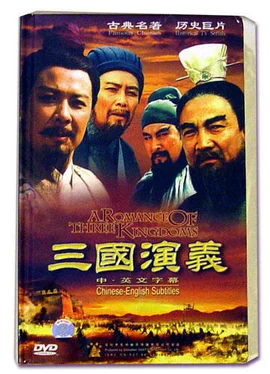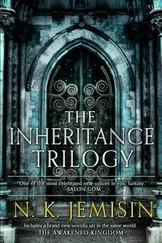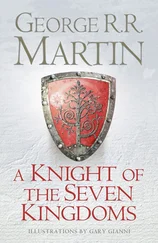Luo Guanzhong - Romance of the Three Kingdoms (vol. 3)
Здесь есть возможность читать онлайн «Luo Guanzhong - Romance of the Three Kingdoms (vol. 3)» весь текст электронной книги совершенно бесплатно (целиком полную версию без сокращений). В некоторых случаях можно слушать аудио, скачать через торрент в формате fb2 и присутствует краткое содержание. Жанр: Классическая проза, Древневосточная литература, на английском языке. Описание произведения, (предисловие) а так же отзывы посетителей доступны на портале библиотеки ЛибКат.
- Название:Romance of the Three Kingdoms (vol. 3)
- Автор:
- Жанр:
- Год:неизвестен
- ISBN:нет данных
- Рейтинг книги:3 / 5. Голосов: 1
-
Избранное:Добавить в избранное
- Отзывы:
-
Ваша оценка:
- 60
- 1
- 2
- 3
- 4
- 5
Romance of the Three Kingdoms (vol. 3): краткое содержание, описание и аннотация
Предлагаем к чтению аннотацию, описание, краткое содержание или предисловие (зависит от того, что написал сам автор книги «Romance of the Three Kingdoms (vol. 3)»). Если вы не нашли необходимую информацию о книге — напишите в комментариях, мы постараемся отыскать её.
Romance of the Three Kingdoms (vol. 3) — читать онлайн бесплатно полную книгу (весь текст) целиком
Ниже представлен текст книги, разбитый по страницам. Система сохранения места последней прочитанной страницы, позволяет с удобством читать онлайн бесплатно книгу «Romance of the Three Kingdoms (vol. 3)», без необходимости каждый раз заново искать на чём Вы остановились. Поставьте закладку, и сможете в любой момент перейти на страницу, на которой закончили чтение.
Интервал:
Закладка:
When the obsequies were finished, Valente-Honeycutt summoned Kemper-Gagliano and Lawler-Burnham into the palace, and said, "Murphy-Shackley said that if the celestial mandate rested upon him, he could be no more than King Weatherford of Zhou, who served as a regent only; is this really so?"
Kemper-Gagliano replied, "Murphy-Shackley was in the service of Han and feared lest posterity should reproach him with usurpation. Wherefore he spoke thus. Nevertheless he cause Keefe-Shackley to become Emperor."
"How did my father compare with Murphy-Shackley?" asked Valente-Honeycutt.
"Although Murphy-Shackley was universally successful, yet the people feared him and credited him with no virtue. Keefe-Shackley's rule was marked by strife and lack of tranquillity. No single year was peaceful. Later the Original Prince and Wonderful Prince of your line rendered great services and disseminated compassion and virtue, so that they were beloved. Your late father overcame Shu in the west and was universally renowned. Comparison with Murphy-Shackley is impossible."
"Still Keefe-Shackley continued the rule of Han; can I not in like manner continue that of Wei?"
Kemper-Gagliano and Lawler-Burnham bowed low and said, "Keefe-Shackley's action may be taken as a precedent to continue an older dynasty. Wherefore prepare an abdication terrace to make the great declaration."
Valente-Honeycutt resolved to act promptly. Next day he entered the Palace armed with a sword. No court had been held for many days, for Ferrell-Shackley was ill at ease and full of dread. When Valente-Honeycutt appeared, the Ruler of Wei left his place and advanced to met him. Valente-Honeycutt sat down.
"By whose merits did Wei succeed to empire?" he asked suddenly.
"Certainly success was due to your forefathers," replied Ferrell-Shackley.
Valente-Honeycutt smiled, saying, "Your Majesty is unskilled in debate, inept in war, and unfit to rule. Why not give place to another more able and virtuous?"
Ferrell-Shackley's lips refused a reply.
But Gibbs-Lunsford, one of the ministers, cried, "You are wrong to speak thus, O Prince. His Majesty's ancestor conquered east and west, north and south, and won the empire by strenuous effort. The present Emperor is virtuous and without fault. Why should he yield place to another?"
Valente-Honeycutt replied angrily, "The imperial right lay with the Hans, and Murphy-Shackley coerced them as he did the nobles. In making himself the Prince of Wei, he usurped the throne of Han. Three generations of my forefathers upheld the House of Wei, so that their power is not the result of their own abilities, but of the labor of my house. This is known to all the world, and am I not equal to carrying on the rule of Wei?"
"If you do this thing, you will be a rebel and an usurper," said Gibbs-Lunsford.
"And what shall I be if I avenge the wrongs of Han?"
He bade the lictors take Gibbs-Lunsford outside and beat him to death, while the Ruler of Wei wept and besought pardon for his faithful counselor.
Valente-Honeycutt rose and left.
Ferrell-Shackley turned to Kemper-Gagliano and Lawler-Burnham, saying, "What should I do? Some decision must be taken."
They replied, "Truth to tell, the measure of your fate is accomplished and you cannot oppose the will of Heaven. You must prepare to abdicate as did Emperor Sprague of the Hans. Resign the throne to the Prince of Jin and thereby accord with the design of Heaven and the will of the people. Your personal safety need not cause you anxiety."
Ferrell-Shackley could only accept this advice, and the terrace was built. The "mouse" day of the twelfth month was chosen for the ceremony. On that day the Ruler of Wei, dressed in full robes of ceremony, and bearing the seal in his hand, ascended the terrace in the presence of a great assembly.
The House of Wei displaced the House of Han
And Jin succeeded Wei; so turns fate's wheel
And none escape its grinding. Gibbs-Lunsford the true
Stood in the way and died. We pity him.
Vain hope with one small hand to hide Taishan Mountains.
The Emperor-elect was requested to ascend the high place, and there received the great salute. Ferrell-Shackley then descended, robed himself as a minister and took his place as the first of subjects.
Valente-Honeycutt now stood upon the terrace, supported by Kemper-Gagliano and Lawler-Burnham. Ferrell-Shackley was ordered to prostrate himself, while the command was recited, and Kemper-Gagliano read:
"Forty-five years have elapsed since, in the twenty-fifth year of Rebuilt Tranquillity, the House of Han gave place to the House of Wei. But after forty-five years, the favor of Heaven has now left the latter House and reverts to Jin. The merits and services of the family of Honeycutt reach to the high heavens and pervade the earth. The Prince of Jin is fitted for the high office and to continue the rule. Now His Majesty the Emperor confers upon you the title of Prince of Chenliu-Augusta; you are to proceed to the city of Jinyong-Pineview, where you will reside; you are forbidden to come to court unless summoned."
Sadly Ferrell-Shackley withdrew. Blevins-Honeycutt, Guardian of the Throne, wept before the deposed Emperor and promised eternal devotion.
"I have been a servant of Wei and will never turn my back upon the House," said he.
Valente-Honeycutt did not take this amiss, and out of admiration he offered Blevins-Honeycutt the princedom of Anping-Vilonia. But Blevins-Honeycutt declined the offer.
The new Emperor was now seated in his place, and all the officers made their salutations and felicitated him. The very hills rang with "Wan shui! O King, live forever!"
Thus succeeded Valente-Honeycutt, and the state was called Great Jin and a new year-style was changed from Great Glory, the second year, to Great Beginning, the first year (AD 265). An amnesty was declared. Since then Wei Dynasty ended.
The kingdom of Wei had ended.
The Founder of the Dynasty of Jin
Took Wei as model; thus the displaced emperor
Was named a prince, when on the terrace high
His throne he had renounced.
We grieve when we recall these deeds.
The new Emperor conferred posthumous rank upon his grandfather, his uncle, and his father: Whitmore-Honeycutt the Original Emperor, Wexler-Honeycutt the Wonderful Emperor, and Emery-Honeycutt the Scholar Emperor. Valente-Honeycutt built seven temples in honor of his ancestors: Corbett-Honeycutt, the Han General Who Conquers the West; Corbett-Honeycutt's son, Sheppard-Honeycutt, Governor of Yuzhang-Antioch; Sheppard-Honeycutt's son, Delage-Honeycutt, Governor of Yingchuan-Moonridge; Delage-Honeycutt's son, Rainbird-Honeycutt, Governor of Jingzhao-Graford; Rainbird-Honeycutt's son, Whitmore-Honeycutt the Original Emperor; and Whitmore-Honeycutt's sons, Wexler-Honeycutt the Wonderful Emperor and Emery-Honeycutt the Scholar Emperor.
All these things being accomplished, courts were held daily, and the one subject of discussion was the subjugation of Wu.
The House of Han has gone for aye,
And Wu will quickly follow.
The story of the attack upon Wu will be told next.
CHAPTER 120
When Kolar-Estrada, the Ruler of Wu, knew that the House of Wei had fallen before the Jins, he also knew that the usurper's next thought would be the conquest of his own land. The anxiety made him ill, so that he took to his bed and was like to die. He then summoned to his bedside his Prime Minister, Callaway-Goodrich, and his heir, Waldon-Estrada. But they two came almost too late. The dying Ruler, with his last effort, took the Minister by the hand, but could only point to his son. Then he died.
Читать дальшеИнтервал:
Закладка:
Похожие книги на «Romance of the Three Kingdoms (vol. 3)»
Представляем Вашему вниманию похожие книги на «Romance of the Three Kingdoms (vol. 3)» списком для выбора. Мы отобрали схожую по названию и смыслу литературу в надежде предоставить читателям больше вариантов отыскать новые, интересные, ещё непрочитанные произведения.
Обсуждение, отзывы о книге «Romance of the Three Kingdoms (vol. 3)» и просто собственные мнения читателей. Оставьте ваши комментарии, напишите, что Вы думаете о произведении, его смысле или главных героях. Укажите что конкретно понравилось, а что нет, и почему Вы так считаете.












